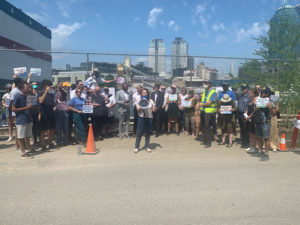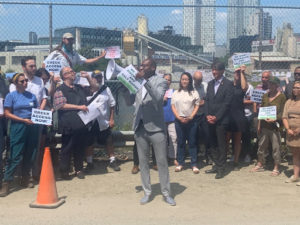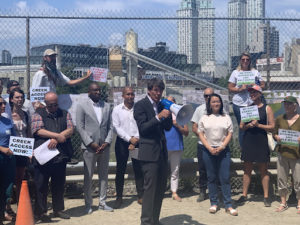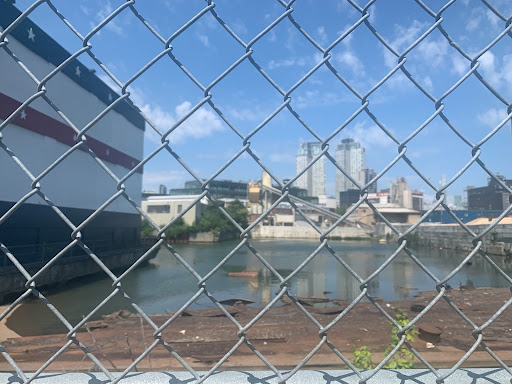Newtown Creek Alliance demands action to open creek
‘Public Land for Public Use’
Hidden behind a chain link fence and construction sites in Long Island City, the beginning of Newtown Creek is easily forgotten by nearby residents. The shoreline on 29th Street at the Dutch Kills tributary is often overlooked. However, the Newtown Creek Alliance has made it their mission to ensure that its inaccessibility and unappealing, debris-filled appearance does not allow it to be ignored or disregarded.

Council Member Julie Won leads organizers in the chant “Public Land for Public Use”
In a press conference on Friday, July 15, organizers from the Newtown Creek Alliance called upon elected officials — specifically State Governor Kathy Hochul and Mayor Eric Adams — as well as the Metropolitan Transportation Authority, the NYC Department of Transportation, and the NYS Department of Environmental Conservation, to address unsafe conditions of the bulkhead and adjacent roads, rebuild the shoreline, and incorporate public access to the water.
Newtown Creek stretches between Queens and Brooklyn, eventually flowing into the East River. It is nearly four miles long and is comprised of five small branches: Maspeth Creek, Whale Creek, the East Branch, the English Kills, and the Dutch Kills. The latter of which, the Dutch Kills Shoreline, is where the Newtown Creek Alliance and members of the Long Island Community, demand action for what has been deemed dangerous and deteriorating conditions around and in the water.
Currently, the street neighboring the Dutch Kills tributary in Long Island City is owned by the MTA, and it is used by DOT.
Among the elected officials who attended the press conference include Councilwoman Julie Won, Borough President Donovan Richards, and Assemblyman-elect Juan Ardila.

Queens Borough President Donovan Richards Jr. gives his full support for making the Dutch Kills tributary accessible, saying he is “not a fair weather friend.”
“As Frederick Douglass so eloquently put it, without struggle there is no progress,” Richards said under some heavy summer heat. “This is going to be a long struggle, but I want you to know that you have my 2000 percent commitment. I am not a fair-weather friend. As you can see, I will be with you when it’s hot, when it’s raining, when it’s storming and when the snow is out to make sure that we get this done.”
The bulkhead shoreline on the MTA-owned street is collapsing into the waterway, with the most recent taking place in February 2022. Following this collapse, the Newtown Creek Alliance sent a letter to the heads of the MTA, DOT, and the DEC to take action to restore the tributary.
“Given the ownership of the land by MTA (Block 115, Lot 86); the use of the property as a through street managed by NYC DOT (29th street); and NYS DEC’s regulatory authority regarding waterway pollution and shoreline construction, we firmly believe that all three agencies have an obligation to address this issue,” the letter reads.
The letter continues on to detail what the creek needs to be revitalized, placing further responsibility upon the MTA for the creek’s continued destruction. In the EPA’s Superfund investigation, the MTA/LIRR was named a “potentially responsible party” for the tributary’s decline.
“Given this potential liability that MTA/LIRR has in contributing to the historic contamination of Newtown Creek, we believe that DEC has an even stronger obligation to require a shoreline redesign that incorporates ecological benefits such as intertidal habitat, as well as public access to this historically damaged and inaccessibly waterway.”
LaGuardia Community College can be found directly next to the Dutch Kills, and leaders within the college’s community have expressed complete support for the demands of the Newtown Creek Alliance. Faculty and students do research on the waters of Newtown Creek, however, they currently have to travel several miles from campus to access the water and collect the samples, despite having the creek directly behind the college’s C building.

Kenneth Adams, the president of LaGuardia Community College, said he felt “extremely confident” that Newtown Creek would be transformed.
Representing the college at the press conference was its president, Kenneth Adams.
“Let me just recommit LaGuardia Community College as an anchor institution in Western Queens,” Adams said. “We recommit to this project, and to do all we can in partnership with our elected officials and all of [the] advocates to make it happen. It’s going to happen.”
Newtown Creek, however, is currently unsafe for any potential LaGuardia College students or local swimmers. Until the second half of the 20th century, industries would dispose of their unwanted chemicals or byproducts into the waters with little-to-no government regulation. The natural depth of the creek once was 12 feet, but now can be as shallow as four feet in some places.
In 2010, Newtown Creek was named a Superfund site by the Environmental Protection Agency. Through this designation, the creek became part of a program that works to mediate some of the nation’s most contaminated areas.
Hanging along the fence encompassing the creek were the community-led plans for the site, shown for the first time to the public. These plans include a salt marsh, terraced seating, and benches so the creek could be used and admired by residents.
For more information on the proposed future and further advocacy of the Newtown Creek Alliance, visit www.newtowncreekalliance.org.


